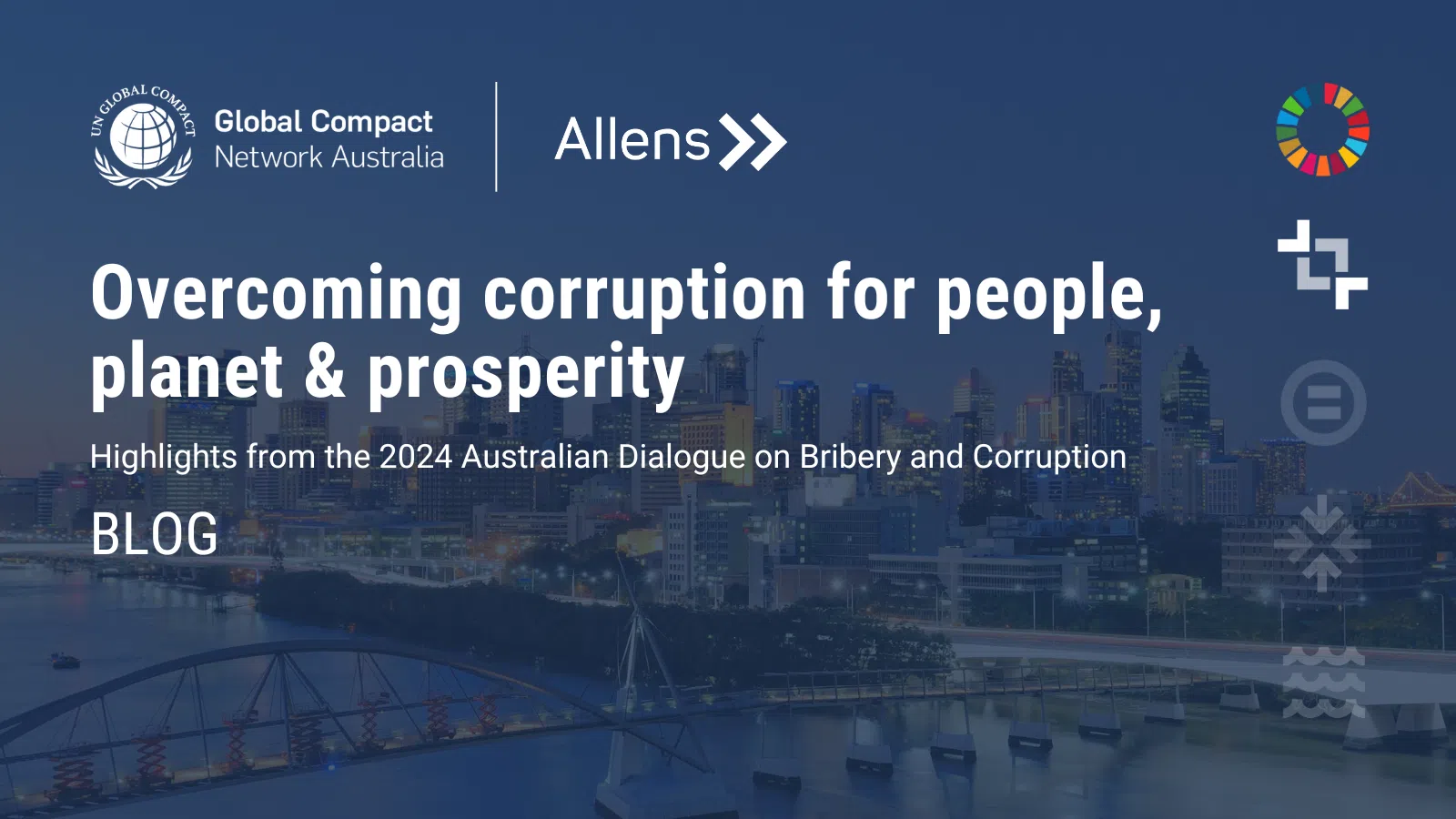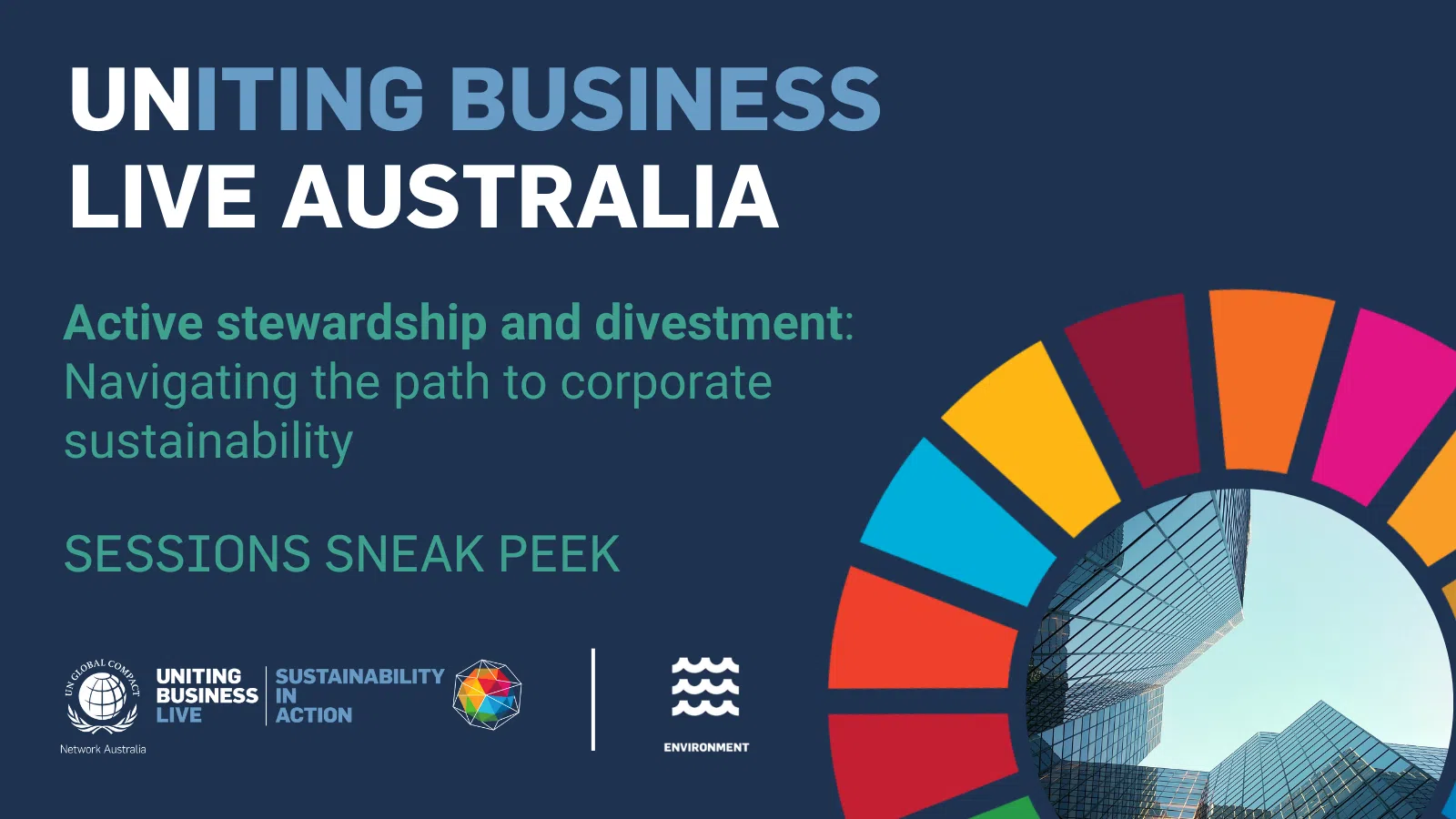
Blogs, Events, Featured, Sustainability Governance
BLOG | Overcoming corruption for people, planet & prosperity: Highlights from the 2024 Australian Dialogue on Bribery and Corruption
Lara Taylor | December 13, 2024
Overview
On 7 August 2024, the UN Global Compact Network Australia (UNGCNA), in collaboration with Allens, hosted the 9th edition of Australia’s annual multi-sector, multi-stakeholder forum dedicated to advancing the Australian anti-bribery and corruption (ABC) agenda.
The 2024 Dialogue explored the theme: Overcoming corruption for people, planet & prosperity. We were grateful to have a keynote address delivered by the Hon Mark Dreyfus KC MP, Attorney-General of the Commonwealth of Australia. It was also the first time that the Dialogue was hosted in Brisbane, and we were delighted to see such a strong attendance and participation.
Attorney-General’s Keynote
Attorney General Mark Dreyfus KC MP, delivered keynote remarks on the following:
Integrity reform agenda
- Combatting corruption and its impact is a high priority for the AG
- A central part of the government’s domestic policy agenda has been to restore public trust and strengthen standards of integrity in the federal government.
- To detect and investigate corruption within government, the National Anti-Corruption Commission was established, and the Government released a new Commonwealth Fraud and Corruption Control Framework applying to Commonwealth agencies.
- In December 2023, Australia published its Third National Action Plan under the Open Government Partnership, including an initiative to progress the establishment of a Beneficial Ownership Register.
Combatting Foreign Bribery
- The Combatting Foreign Bribery reforms commence on 8 September 2024.
- A new offence would make corporations directly liable for the foreign bribery activities of their employees, external contractors, agents and subsidiaries, unless the company can demonstrate it had ‘adequate procedures’ in place.
- ‘Adequate procedures’ guidance will assist corporations to take steps to prevent the bribery of foreign public officials.
Bribery Prevention Network
- The AG recognised the contribution of the Bribery Prevention Network in bringing together business, civil society and government to work together to enhance the capability of Australian companies to address foreign bribery risks.
AML / CTF Reforms
- The AG also noted that the Government is progressing important reforms to Australia’s anti‑money laundering and counter-terrorism financing (AML / CTF) regime. He noted that these reforms will extend the regime to ‘tranche-two entities’ including lawyers, accountants, and real estate professionals.
A copy of the Attorney-General’s full speech is available here.
Panel Discussions
Panel discussions addressed each area of the Environment, Social and Governance (ESG) agenda. The panels were conducted under the Chatham House rule. We have outlined below some key takeaways from each panel.
Environment Panel: Safeguarding integrity in the green transition
Enormous scale of opportunity exists with the green transition
- The huge demand for critical minerals provides a once in a generation development opportunity for countries with those resources.
- Australia is aiming to become a renewable energy superpower, underpinned by the Future Made in Australia agenda, which will enable very large investment flows both of public and private funds.
- Many critical minerals are located in high corruption risk jurisdictions, driving an imperative to strengthen anti-corruption frameworks.
- As governments and institutions invest capital into renewable energy projects, it increases the risk of potential misuse of funds.
Underlying the green transition is a sense of urgency and requirement for speed.
- The speed imperative creates risks if the right regulatory settings are not in place or are loosened in the name of red tape reductions.
- To move quickly, businesses need the trust of local communities.
Social Panel: The human impact of corruption
We sometimes need a reminder corruption also has profound social implications.
- The typical drivers for anti-corruption in Australia are legal compliance and organisational resilience.
- Deterrence of corruption involving public officials in Australia is critical to prevent the diversion of public resources away from public priorities (eg Western Sydney airport case) and the undermining of trust in public institutions.
- Globally, we see that corruption leads to significant social harms, including human rights violations, the displacement of Indigenous populations, loss of land, and the erosion of institutional trust.
- The collapse of Rana Plaza serves as a stark reminder of the consequences of corruption through supply chains, where bribery and substandard construction led to deaths. It also highlights that well intended measures to address problems may not succeed if they do not stamp out corruption as an underlying root cause.
- The expansion of ESG creates the need for an integrated approach to risks and responses.
Companies who take a long-term and proactive perspective will be stronger
- Companies operating in global markets are having to navigate multiple different laws and compliance approaches.
- Social forces and social processes shape the regulatory landscape. What is considered immoral today, may be criminal tomorrow. What is not enforced today, may be enforced tomorrow.
- Companies need to determine their own moral compass, to retain their licence to operate – both in the legal and social sense.
Governance Panel: Strengthening anti-corruption frameworks
Expectations for the foreign bribery reforms
- The new “failure to prevent” offence, commencing on 8 September 2024, is a significant change to the legislative framework because bribery by an associate of a corporation would automatically trigger corporate liability.
- The inclusion of an “adequate procedures” defence is intended to incentivise businesses to adopt stronger strong due diligence mechanisms and internal compliance policies.
- The defence as well as the related Adequate Procedures Guidance (APG) from AGD, are helping to set expectations for companies and to foster a broader culture of integrity.
- The APGs are risk-based and principles-based, so that they can be used by organisations of all sizes across the economy. This is to encourage tailored risk assessments and a proportionate approach to manage those risks.
- For a company to demonstrate that it had “adequate procedures” in place, it will be important to show any procedures were adequate and effective when considering the particular risks that were identified by a risk assessment.
Practical ways business are preparing for the reforms
- Forward looking companies are uplifting their governance to ensure they have: robust and clear anti-bribery and sanctions procedures; updated Code of Conduct; complete through risk assessments and have robust due diligence programs that provide insight into risks posed by counterparties.
- Some businesses are preferring the approach of introducing frameworks at the level of principle, rather than prescriptive processes and procedures that might be used against them if ever in issue.
- It is critical for businesses to focus on what actions are taken on the ground for ownership and implementation of policies. Consider things such as: their knowledge of in-country agents or representatives; how you engage with government officials; escalating responses to identified risks; and a culture of supporting whistleblowers.
- Setting the tone from the top is greatly supported by Board approved frameworks, communications across the business from executives and genuinely enabling employees to speak up when they see something wrong.
Relationship between regulators and corporations
- What constitutes “adequate procedures” will ultimately be up to the courts, but regulators will need to have the ability to assess adequate procedures in an investigation and enforcement context.
- Companies need to be well informed about any identified incidents and have a good understanding of how they will deal with regulators, before making any decision to self-report in Australia.
- If a company does decide to engage with regulators and disclose an incident, it has to be prepared to plead guilty and have years in the justice system.
- The possibility of introducing deferred prosecution agreements might be considered again when the legislation is reviewed after 18 months of operation.
We would like to extend our thanks to all speakers and attendees for their generous participation. The 2024 Dialogue was made possible by the kind support of Allens.


